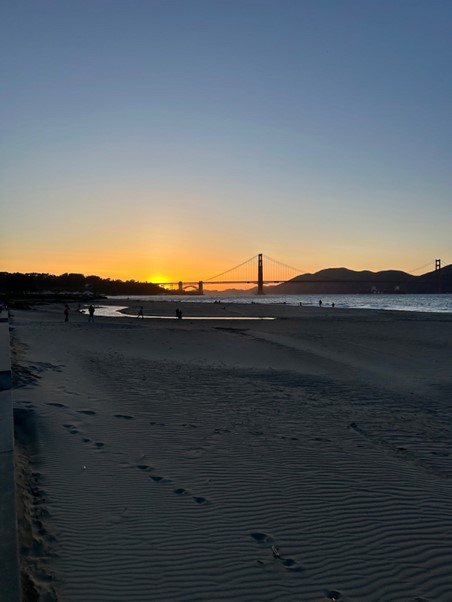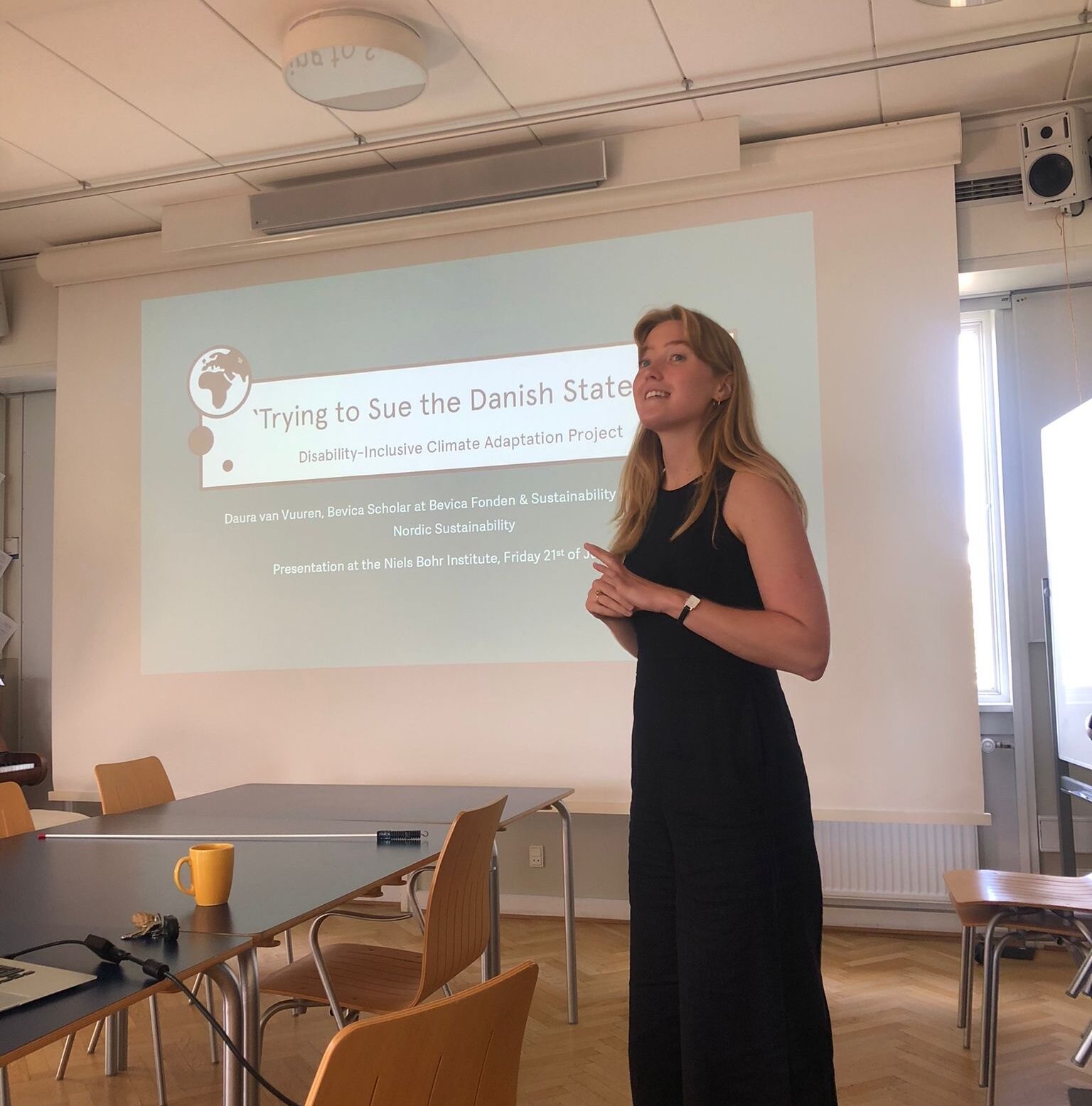Daura van Vuuren

Winner of the Bevica Scholarship of DKK 350.000.
Universal Design Enabling Disability-Inclusive Climate Action in Denmark
The Danish state does not safeguard the rights of people with disabilities when it comes to climate action policies, whilst actually having the legal obligation to do so. Due to the massive knowledge gap and the current lack of accountability for pledges made by Denmark in the Paris Agreement and Convention on the Rights of Persons with Disabilities, Daura van Vuuren’s project will collect international learnings under the supervision of the Disability-Inclusive Climate Action Research Program (DICARP) based at McGill University, Canada. Building upon this, her project will focus on integrating the latest climate science for Denmark, to combine the findings and explore a legal call to action in close collaboration with disability advocates and human rights lawyers.
Daura’s plan is to first travel to Montréal to kick-start the collaboration with DICARP, and potentially include a longer trip to North America to visit promising initiatives while being in the region. Then, her plan is to travel to leading disability-inclusive climate action and litigation initiatives across Europe with flexibility to expand to other regions when relevant for the project. The further investigation will be based in Copenhagen and across Denmark.
The plan is to start the international investigation in early 2024 and to conduct the international visits throughout 2024, to be able to use it as a solid foundation for the continued research investigation and advocacy work in Denmark.
Watch the winning pitch below.
Follow
Daura van Vuuren
's investigation
There has been a change in Daura’s investigation journey. She has expanded her travel plans to include Indonesia, Australia, Pacific Islands and New Zealand. Below you can read posts along the way from her journey where she describes the experiences she has had and what she has learned so far.
March 2024
.png)
March and April 2024
New York – Vancouver – Montreal – Los Angeles – San Francisco – Boston – New York
The main objective of the project is to analyse the potential for a legal case against the state of Denmark as the rights of people with disabilities are not safeguarded in the climate adaptation policies. There is a strong need to enhance the consultation and involvement of people with disabilities in the policy-making process, and so this project is built around the wider aim of establishing an international network to share learnings and contribute to an improved understanding of the most significant issues to be taken into account in Denmark.
The project is highly interdisciplinary and involves many different areas of expertise, such as human rights, climate risks and impacts, inclusive design, health, disaster risk management, technology and innovation, and to go on. It therefore presents a matter of making the right connections and collect new ideas to strengthen the project’s impact potential.
For this reason, I started off my project by travelling to North America last March and April, first to New York City then to Montréal, Vancouver, Los Angeles, San Francisco, Boston and back to New York City again. The main aim was to deepen my understanding of the current state of the policy field, specifiically in a region with a long history in disability rights. I was curious to find out what expertise there already is on these issues, which learnings I could potentially build further upon and what the most pressing knowledge gaps are. During my trip, I connected with human rights practitioners, advocacy groups, professors, researchers, and disability rights experts working in the areas relating to the project. While I gathered foundational knowledge on the subject matter and its socio-political contexts, I gradually developed the project approach as shown in Figure 1 using the input collected.

A key reflection from my trip is the importance of messaging and how to be aware of these nuances in conversations with various stakeholders. For instance, the difference in a legal versus a political approach to the issue. Legally and specifically in building a legal argument, there is a need to single out people with disabilities as a separate group and substantiate how this group is disproportionately affected. In comparison, policy-wise, there is much added value in explaining how people with disabilities are a highly diverse group, that all abilities are temporary, and that these issues concern a substantial part of the general population. This is then captured in reasoning that inclusive policies are therefore better policies for all.
In extension of this, there is such a problem versus solution focus to this project. There is a strong need to diagnose the ‘problem’ at hand, to improve the collection of statistics, integrate personal stories and indicate how people with disabilities are completely overlooked. However, in this, to strengthen the constructive purpose of this project, there should be a strong emphasis on coming up with short-term immediate solutions. I learned in conversations how this is extremely important in challenging mindsets on how the interdisciplinary collaborations and innovations required relate to someone’s own field.
There are many reflections from my travels, I am currently trying to document them all. At the moment, I am back to full-time work at Nordic Sustainability and am also having open conversations with the Danish stakeholders to help take the next steps in the project. It is an exciting new phase, to try and translate these learnings and to set foot in Denmark for the project over the years to come.
Therefore, there is much to come, so stay tuned!








June 2024
Presentations
Daura has been actively sharing her research project with the academic community. Recently, she delivered a comprehensive presentation at the Niels Bohr Institute at the University of Copenhagen. During her talk, Daura elaborated on the objectives and methodologies of her Disability-Inclusive Climate Adaptation Project, which has garnered significant interest within her field.

September 2024
.png)
Jakarta
“Measure progress by the ones in the back,” shared Farhan Helmy, speaking about his efforts to generate data and knowledge regarding the impacts of climate change on people with disabilities and the elderly in Indonesia.
Farhan Helmy is the co-founder of DILANS, the Indonesian Disability and Elderly Movement, founder/CEO of the Advanced System Computing, Design and Innovation (ASCODI) Laboratory, as well as the Chair of Thamrin School of Climate Change and Sustainability. He has over 20 years of national and international experience in climate science, environmental policy and governance, including the National Council on Climate Change Indonesia and UNEP IETC, and brings a wealth of expertise to the table.
Our conversation was incredibly insightful, especially given his personal experience of living with a disability in Indonesia, and being a great advocate for the Nothing About Us Without Us principle.
He emphasized that the collective dimension to climate policies is often overlooked, highlighting the urgent need to measure and monitor climate impacts on vulnerable groups. Helmy believes that demonstrating proof of concept—by showcasing achievable changes through a community-based approach—can harness transformative power and attract more funding and political support. He has been leading such a data generation project in the Bandung district, which he is hoping to expand when acquiring adequate public funding.
In a country where approximately 50 million people are classified as disabled or elderly, it is clear that effective climate adaptation interventions cannot focus solely on the dominant demographic. Geo-spatial analysis and the principles of Universal Design, especially in the built environment, are crucial for creating inclusive solutions.
When asked about his key message, Farhan highlighted the critical need for the systematic transfer of essential spatial and sensor-based data across various platforms. He stressed the importance of leveraging artificial intelligence to accelerate the scaling of these initiatives across all 30 districts in Indonesia. Currently, it requires 40 researchers working for a year on each district, and he powerfully asserted, “There’s no time to wait for a linear scale-up.”
—
This is a preview of my ‘collected stories’ book, which will compile insights and stories on disability-inclusive climate action gathered during my Bevica Scholarship project in 2024. Stay tuned for more updates!


